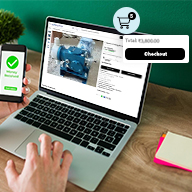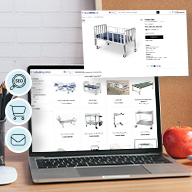Why MSMEs in India should start selling online

Ecommerce
298 week ago — 9 min read
Did you know that the e-commerce business in India is expected to reach nearly $120 billion by 2020 from $30 billion in the year 2016? There are currently 147.8 million e-commerce users in India contributing to an annual revenue generation that is growing at a whopping annual rate of 51%. And according to India Brand Equity Foundation (IBEF), India is poised to become the fastest growing e-commerce market in the next few years.
Is all that fact and data bemusing? Are you a small or medium sized enterprise who hasn’t ventured into online selling yet? Has this made you wonder if you should take the first step to be part of the e-commerce revolution India will witness in the coming years? If the answer to all the above questions is yes, then this article is for you!
The e-commerce phenomenon is almost 25 years old and has truly reshaped the way business is done in India and the world. But it is surprising to know that out of over 63 million MSMEs in India; only 2% are selling online. MSMEs are the key drivers of economic growth in the country and if the dream of achieving a $5 trillion economy by 2020 is to be fulfilled, MSMEs need to start selling online in order to scale.
Read on…
E-commerce: The goose that lays golden eggs (how can MSMES leverage the power of e-commerce?)
This rhetoric has a deeper meaning than you thought. Even though MSMEs in India are contributing to nearly 80 million jobs in the country, yet most of these small businesses remain small, as in, their scope of growth becomes limited and soon they end up becoming stagnant. So, there is clearly something that isn’t working for them. Apart from a lack of infrastructure and limited capital, one major road block is reaching out to newer customers. How do you solve that? The answer lies in e-commerce. You ask how? We present you the irresistible benefits of selling online:
1. Increasing internet usage
The trend of online shopping can be attributed to the increasing internet penetration worldwide. Global online sale is growing and reached around 8.8% of total retail spending in 2018. This brings a promising opportunity for the Indian MSMEs to utilise the power of e-commerce. Currently, India is not grasping the at-hand e-commerce business opportunities. With the number of internet users increasing every day, MSMEs can greatly benefit from selling online.
2. Doesn’t require much investment in infrastructure
As opposed to a brick and mortar store, an e-commerce business doesn’t require a very high startup cost. You don’t have to construct/rent a building, buy a large number of vehicles and hire a lot of staff. You simply need to build a good website and start selling. Linker.store makes it easy to start an e-commerce website. The added bonus? It’s absolutely free!
3. Reduces operational costs
Running an e-commerce store has miniscule operational costs. For example, you don’t need to hire staff for your online store. Additionally, rent, electricity and other recurring costs are eliminated.
The e-commerce phenomenon is almost 25 years old and has truly reshaped the way business is done in India and the world. But it is surprising to know that out of over 63 million MSMEs in India; only 2% are selling online.
4. The world is at your feet
You no longer have to rely on a multi-tiered distribution network to have a nation-wide (or global) footprint. Reach out to customers in any part of the country and even overseas. You can also have a 24x7 business presence as compared to brick and mortar stores that need you to shut down at a specific time. An online website also gives you a great opportunity to collect and store customer data (data collection and lead generation). You can reach out to all these customers with special discounts and offers directly in order to increase sales.
5. Gives your brand greater recognition
Your products or services maybe very well-known and well-loved in your city or some nearby areas where you are exporting to but many people who love purchasing online might not be aware of your business. Taking your business online will provide you with a great opportunity to enter into this untapped market and will thus give your business a higher brand recall.
Your e-store is also a great marketing tool. You now have a great way to showcase your products and services that will appeal to your customers.
Also read: Getting started with online sales? Here is everything you need to know
6. Limited capital and other inefficiencies? Not anymore
Studies have shown that businesses that sell online grow faster than their brick and mortar counterparts. This can be accredited to the huge customer base that an online business opens up. With a larger profit flowing in every month, you no longer have to worry about capital and the fact that e-commerce is totally transparent, even a small seller at some remote corner of the country has the visibility over the changing trends, prices and much more.
8. Payment collection made easier
An e-commerce business even makes the collection of payments secure, faster and easier. With a host of payment gateways available for Indian entrepreneurs, a merchant can choose the one to fit his budget and requirement. Recently Instamojo raised $7 million to help MSMEs understand and utilise the power of selling online.
Marketplace or your own e-commerce store?
Now that you understand the benefits of selling online, the next question that will come to your mind is how? The answer lies in either selling via a marketplace or starting your own online store a personal business website.
- Marketplaces- Many small businesses might not have the proper resources or the knowledge to start their online website immediately. Here comes the term ‘marketplace’ into action. A Marketplace is an e-commerce website where you can list your products which is then sold by the marketplace operator. Some of the famous marketplaces are Amazon, ebay, Flipkart, etc.
- Your own online store- Another alternative is tostart your own e-commerce website. You can either set it up completely on your own or you can use a free online ecommerce platform like Linker.store to help you.
The decision to either sell on a marketplace or own online store is a tough nut to crack. To understand this further, watch this webinar and read this article by Summi Gambhir – CXO and Co-founder of GlobalLinker.
Also read: Wondering if you should build your own e-commerce website or not?
Acts and policies for e-commerce in India
The government of India has taken several initiatives like Digital India, Make in India, Start-up India, Skill India and Innovation Fund to support the e-commerce business in India. The new e-commerce policy rolled out in 2018 will also help create a level playing for all sellers in India.
According to the new policy, startups and MSMEs who have to face fierce competition from those getting good investments from foreign investors, will be given special privileges. Also, any entity involved in marketplace shall no longer exercise ownership or control over the inventory it offers to sell. E-commerce giants will be barred from stocking 25% of their inventory from a single vendor. Online marketplaces can’t manipulate the price of the products and services or offering big discounts. Additionally, warranty and guarantee of goods and services that are sold on marketplaces would now be the responsibility of the seller.
It is also imperative to note that selling online doesn’t make your brick and mortar store irrelevant. You can leverage the power of an online store to allow your customers pick-up-from-store facilities. The key to success is making an appropriate use of both the channels to keep your customers happy.
So what are you waiting for?
Also read: E-commerce: Opportunity, not challenge
Image courtesy: pexels.com
To explore business opportunities, link with me by clicking on the 'Connect' button on my eBiz Card.
Disclaimer: The views and opinions expressed in this article are those of the author and do not necessarily reflect the views, official policy or position of GlobalLinker.
Posted by
GlobalLinker StaffWe are a team of experienced industry professionals committed to sharing our knowledge and skills with small & medium enterprises.
View GlobalLinker 's profile
Most read this week
Trending
Ecommerce 5 days ago













Comments
Share this content
Please login or Register to join the discussion